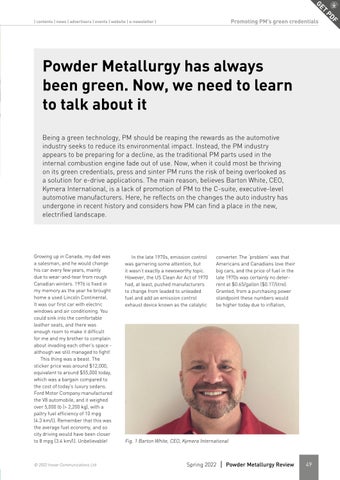T GE
Powder Metallurgy has always been green. Now, we need to learn to talk about it Being a green technology, PM should be reaping the rewards as the automotive industry seeks to reduce its environmental impact. Instead, the PM industry appears to be preparing for a decline, as the traditional PM parts used in the internal combustion engine fade out of use. Now, when it could most be thriving on its green credentials, press and sinter PM runs the risk of being overlooked as a solution for e-drive applications. The main reason, believes Barton White, CEO, Kymera International, is a lack of promotion of PM to the C-suite, executive-level automotive manufacturers. Here, he reflects on the changes the auto industry has undergone in recent history and considers how PM can find a place in the new, electrified landscape.
Growing up in Canada, my dad was a salesman, and he would change his car every few years, mainly due to wear-and-tear from rough Canadian winters. 1976 is fixed in my memory as the year he brought home a used Lincoln Continental. It was our first car with electric windows and air conditioning. You could sink into the comfortable leather seats, and there was enough room to make it difficult for me and my brother to complain about invading each other’s space although we still managed to fight! This thing was a beast. The sticker price was around $12,000, equivalent to around $55,000 today, which was a bargain compared to the cost of today’s luxury sedans. Ford Motor Company manufactured the V8 automobile, and it weighed over 5,000 lb (> 2,200 kg), with a paltry fuel efficiency of 10 mpg (4.3 km/l). Remember that this was the average fuel economy, and so city driving would have been closer to 8 mpg (3.4 km/l). Unbelievable!
© 2022 Inovar Communications Ltd
In the late 1970s, emission control was garnering some attention, but it wasn’t exactly a newsworthy topic. However, the US Clean Air Act of 1970 had, at least, pushed manufacturers to change from leaded to unleaded fuel and add an emission control exhaust device known as the catalytic
converter. The ‘problem’ was that Americans and Canadians love their big cars, and the price of fuel in the late 1970s was certainly no deterrent at $0.65/gallon ($0.17/litre). Granted, from a purchasing power standpoint these numbers would be higher today due to inflation,
Fig. 1 Barton White, CEO, Kymera International
Spring 2022
Powder Metallurgy Review
49
F PD
Promoting PM’s green credentials
| contents | news | advertisers | events | website | e-newsletter |
